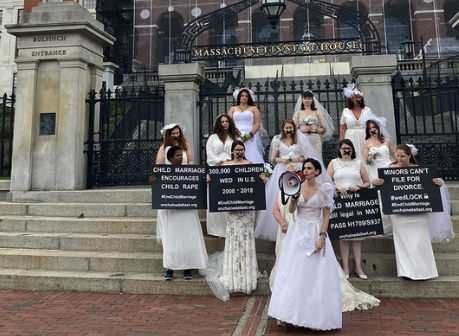In spring of this year, Tennessee legislators proposed a bill to create alternative legal pathways to marriage that left out an essential guideline—a minimum age requirement —prompting a major media uproar. The common law marriages created by the bill are also only accessible to heterosexual couples; however, the bill was primarily attacked for its allowance of child marriage rather than its homophobic intent. The legislators who drafted the bill tried to argue that an age limit would be assumed, but ultimately filed an amendment to the bill in response to the public outcry.
The significant public response to this legislation implies that many Americans oppose child marriage. But, in reality, Americans are mostly just uninformed about the practice: surveys have revealed that more than half of Americans believe that child marriage is already illegal throughout the United States. As of August of this year, only seven states had enacted legislation to ban child marriage. In fact, from 2000 to 2015, over 200,000 minors were legally married within the United States. Between 2000 and 2010, three or more states issued marriage licenses to 12-year-olds, and at least 14 states issued marriage licenses to 13-year-olds. Our federalist system and complex state laws have permitted these marriages while obscuring the policies from public view.
Since jurisdiction over marriage and divorce laws is left up to the states by the Tenth Amendment, marriage laws vary greatly from state to state. Many states appear to set the minimum age at 18, but allow 16- and 17-year-olds to get married if they meet certain criteria like parental consent, judicial approval, the emancipation of the minor, or pregnancy. Nine states permit exceptions to be granted for minors of any age. All states need to eliminate these exceptions as they inflict coercion and direct harm onto minors.
Parental consent is a particularly problematic exception as it can turn child marriages into forced marriages. When legislators consider the opinions of parents as a factor in determining the legality of a marriage, there is a significant risk that parental consent becomes parental coercion. Some judges focus so heavily on whether or not a parent consents to the marriage that they take for granted whether or not the actual participant has consented. One woman, who used the pseudonym Michelle, describes her experience entering a forced marriage at age sixteen. Her father signed the necessary paperwork for her to marry a 22-year-old man, but no one ever asked Michelle if she wanted to get married. The consent of both participants in a marriage must be necessary for its legality. Minors are not able to truly provide informed consent for a marriage, so no marriage involving a minor should be legalized.
Age of consent laws exist because sexual relations with individuals below a certain age always involve coercion, even when the individual believes to be participating willingly. If we can recognize that minors are not able to legally consent to sex, we should also recognize that minors cannot legally consent to marriage. As Jemimah Njuki, an advocate for ending child marriage globally, pointed out in an interview with BRIGHT Magazine, the term “child marriage” is an oxymoron. Marriage involves a contract between two consenting adults. She argues that what she is fighting to end is not marriage at all, but child abuse.
When minors are forced or coerced into a marriage without granting explicit consent, these marriages can have disastrous consequences on their lives. Girls in the United States who marry before their 19th birthday are 50 percent more likely to drop out of high school and four times less likely to graduate from college. Child marriage victims in the United States are also more likely to experience physical, emotional, or verbal abuse and more likely to develop psychiatric disorders.
One of the most dangerous impacts of child marriages stems from the intersection between child marriage and statutory rape laws. Similar to marriage laws, statutory rape and age of consent laws vary greatly across states. In many states, marital exceptions can be used to defend against any statutory rape charge. A majority of child marriages involve underage girls and older men, permitting would-be sex offenders to get around the law by marrying their victims. Even in states without these exemptions, a marriage between a victim and abuser can obscure a rape, statutory or not. Only 3.2 percent of women raped by someone they know reported the crime, compared to 28.6 percent of stranger rapes. Marital rapes are often underreported because the victim fails to define the act as rape. When the victim is underage, this misunderstanding of rape is even more likely, especially when the parents of the minor have approved of or encouraged the nuptials. Children are taught that their parents act with their interest in mind, so young brides and grooms may naively believe that anything supported by their parents must not be a crime.
Americans seem to be aware of the harmful effects of child marriages, as they are quick to denounce the practice in foreign nations. However, they are slow to recognize and confront it within their own borders. While most Americans believe that child marriage is illegal in the United States, the surveyed Americans greatly overestimated its presense in foreign countries. They also incorrectly believed that rates of child marriage are highest in majority-Muslim countries. This lack of knowledge among the American electorate is one of the barriers obstructing legislative change on this issue. It is far easier to call out injustices committed abroad than to recognize the injustices happening in your own backyard, but a critical examination of the actions of your government is a crucial part of living in a democracy. In order to create meaningful change on this issue, activists must apply the same pressure placed on the Tennessee legislature to all state legislatures until they follow the lead of states like Minnesota, Pennsylvania, and Rhode Island, which have already taken action to prevent any more marriages involving vulnerable minors.
